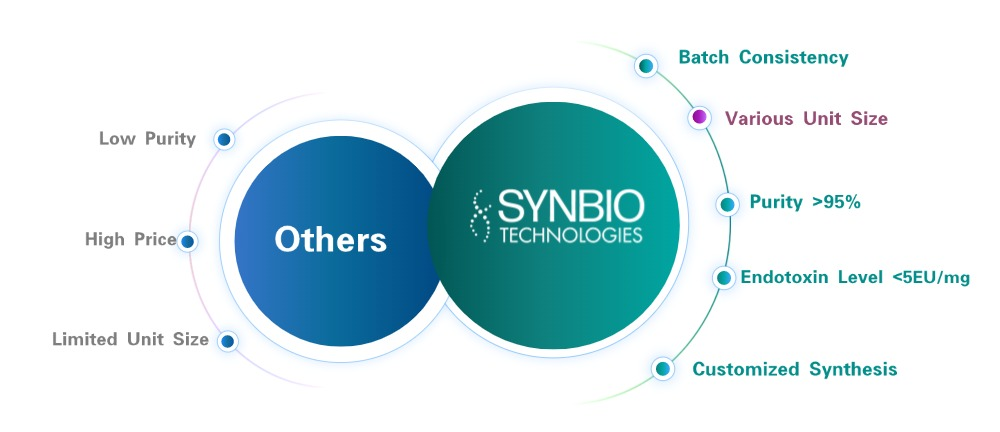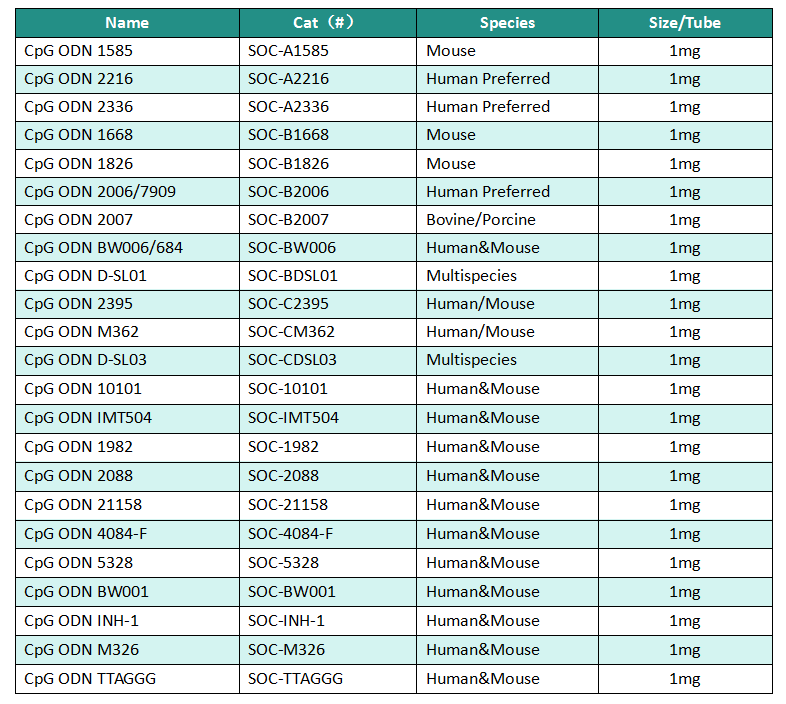Adjuvants play a critical role in vaccine development and immunotherapy by enhancing the immunogenicity of antigens, thereby improving vaccine efficacy. As immunological research continues to advance, CpG oligodeoxynucleotides (CpG ODNs) have gained increasing attention as a novel adjuvant due to their unique mechanism of action and various advantages. Traditional adjuvants include water-in-oil emulsions (such as Freund's adjuvant, complete Freund's adjuvant), oil-in-water emulsions, aluminum salts, liposomes, and others. While these adjuvants have certain advantages in enhancing immune responses, they also have some limitations.
What Are the Unique Advantages of CpG ODNs Compared to Traditional Adjuvants?
Strong Immunity Specificity
CpG ODNs induce a predominantly Th1-type immune response, which enhances the production of IgG2a antibodies and cellular immune responses. This strengthens immune defense against pathogens such as viruses and bacteria. In contrast, traditional adjuvants like aluminum salts primarily enhance IgG1-type immune responses, which may not generate a strong enough defense against certain pathogens, particularly viruses.
Enhanced Immunogenicity and Antigen Presentation
CpG ODNs activate antigen-presenting cells such as dendritic cells and macrophages, enhancing their ability to process and present antigens. Compared to traditional adjuvants, CpG ODNs are more effective at promoting the uptake, processing, and presentation of antigens, thereby improving the immune system's ability to recognize foreign antigens.
Promotion of Cellular Immunity
The immune response triggered by CpG ODNs is not limited to humoral immunity but also significantly enhances cellular immunity. CpG ODNs stimulate the production of CD8+ cytotoxic T cells, playing a crucial role in antiviral and antitumor immunity. In comparison, many traditional adjuvants induce limited cellular immune responses, which may be less effective at triggering antitumor or antiviral immunity.
High Safety Profile
Traditional adjuvants, such as complete Freund's adjuvant, may cause local or systemic side effects due to their strong inflammatory properties, including redness, swelling, hardening at the injection site, or allergic reactions. In contrast, CpG ODNs activate the immune system with high specificity, avoiding excessive activation of non-specific immune cells.
No Dependence on Animal-Derived Components
Many traditional adjuvants, such as Freund's adjuvant, contain animal-derived components, which can elicit immune responses or allergic reactions. CpG ODNs are synthetic DNA molecules that can be obtained through chemical synthesis, thus avoiding potential adverse reactions from animal-derived adjuvants and offering better control and universality.
What role does CpG ODNs play in vaccine development?
CpG ODNs have been widely studied and applied in the development of various vaccines. They can be used as standalone adjuvants or in combination with other antigens or adjuvants to enhance immune responses.
For instance, Shirai et al. found that lipid nanoparticles encapsulating CpG ODNs could act as carriers to enhance the protection range of traditional split influenza vaccines (SV) against both homologous and heterologous viral strains. This combination also more effectively stimulated T cell responses and the production of specific IgG2c antibodies.
Takahashi et al. explored the use of carbonate apatite nanoparticles as CpG ODN delivery vehicles to enhance antigen-specific antibody responses, Th1-type immunity, and CD8+ cytotoxic T lymphocyte responses. This provides a new direction for the development of vaccines against infectious diseases and cancer.
The potential applications of CpG ODNs in vaccine development and immunotherapy are vast, particularly in the fields of antiviral and anticancer therapies, where they have demonstrated excellent immune-boosting effects. Therefore, CpG ODNs are not only a significant area of research in the field of vaccines but also a key tool for future immunotherapy.
Common types of CpG ODNs include ClassA, ClassB, and ClassC, each with different immunological activation abilities and varying interactions with TLR9. Synbio Technologies offers a variety of CpG ODNsproducts, with same-day shipping available for orders placed. Additionally, we can customize and synthesize specific CpG ODNs sequences with tailored modifications according to customer requirements.

Synbio Technologies VS other companies
Products Details

CpG ODNs Product
Reference
[1] Shirai, S., Shibuya, M., Kawai, A., Tamiya, S., & Munakata, L. (2020). Lipid Nanoparticles Potentiate CpG-Oligodeoxynucleotide-Based Vaccine for Influenza Virus. Frontiers in Immunology, 10, 3018. https://doi.org/10.3389/fimmu.2019.03018
[2] Takahashi, H., Misato, K., Aoshi, T., Yamamoto, Y., & Kubota, Y. (2018). Carbonate Apatite Nanoparticles Act as Potent Vaccine Adjuvant Delivery Vehicles by Enhancing Cytokine Production Induced by Encapsulated Cytosine-Phosphate-Guanine Oligodeoxynucleotides. Frontiers in Immunology, 9, 783. https://doi.org/10.3389/fimmu.2018.00783
 DNA Synthesis
DNA Synthesis Vector Selection
Vector Selection Molecular Biology
Molecular Biology Oligo Synthesis
Oligo Synthesis RNA Synthesis
RNA Synthesis Variant Libraries
Variant Libraries Genome KO Library
Genome KO Library Oligo Pools
Oligo Pools Virus Packaging
Virus Packaging Gene Editing
Gene Editing Protein Expression
Protein Expression Antibody Services
Antibody Services Peptide Services
Peptide Services DNA Data Storage
DNA Data Storage Standard Oligo
Standard Oligo Standard Genome KO Libraries
Standard Genome KO Libraries Standard Genome Editing Plasmid
Standard Genome Editing Plasmid ProXpress
ProXpress Protein Products
Protein Products
























